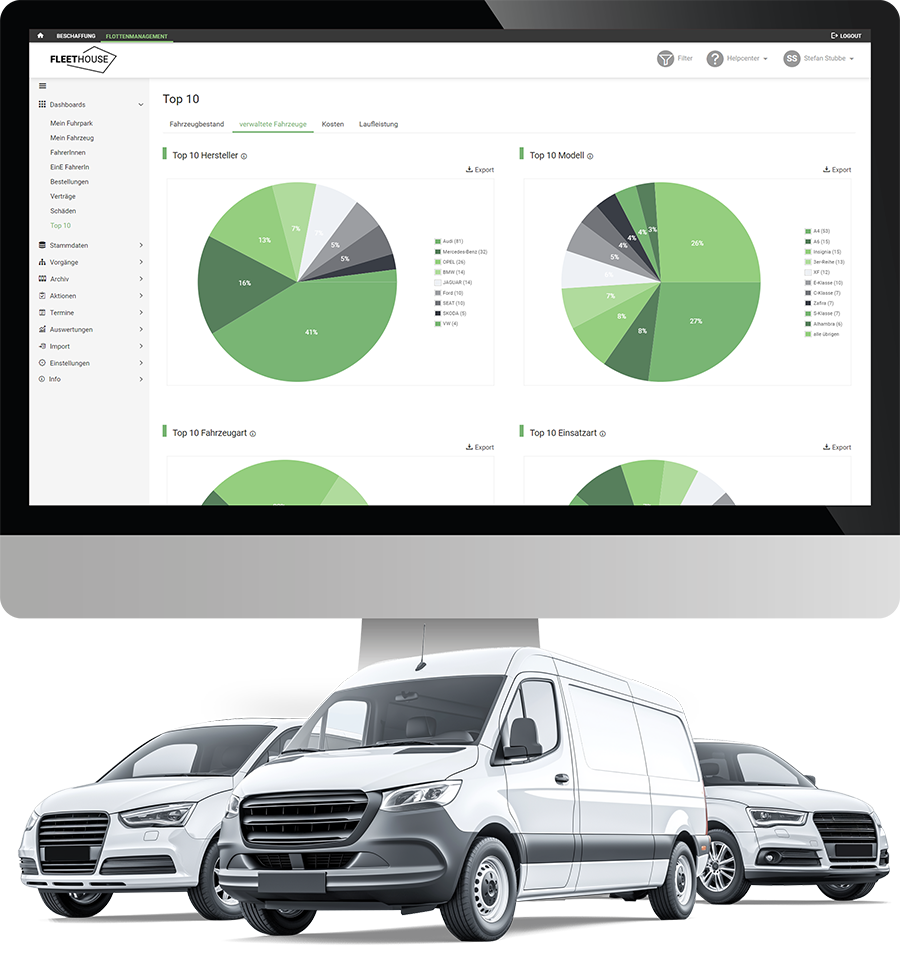Whether large or small – every company needs company cars to be mobile. There are now more than 5 million company vehicles in Germany, and the trend is rising. Would you have guessed that around 65% of new car registrations are accounted for by commercial owners? The procurement of company vehicles is always associated with an investment. You can choose between: Commercial leasing, purchase/financing or rental. But which option is the right one for financing company cars?
In a nutshell: there is no right or wrong here. The type of financing must match the company’s current situation. As the decision to finance a company car has a major impact on the profit and loss account and liquidity, we recommend that you consider the pros and cons and weigh them up individually. To make your decision easier, we have compiled the most important facts for you here.
Contents
What is the difference between commercial leasing, financing and renting?
With vehicle leasing, you borrow your company car for a contractually agreed period at a fixed monthly rate. At the end of the agreed period, you return the vehicle. If you finance or buy a company car, the car becomes your company property and cannot be returned. If you are looking for a short-term vehicle solution, renting a company car can be an interesting alternative.
Leasing company vehicles: advantages, disadvantages and what you should bear in mind
Commercial leasing is a great way to drive a new company car for 2-4 years and still remain liquid. The monthly leasing installments are tax-deductible as operating expenses. At the end of the term, depending on the contract, the leased vehicle is returned to the lessor or, if desired, transferred to the company’s ownership. Our checklist will ensure a smooth leasing return.
Commercial leasing offers very good planning security. Of course, this comes at a price and as a lessee you are bound by the contractual agreements. It is therefore not possible to stop the lease before the agreed end date. There are two basic types of leasing: residual value leasing and mileage leasing.
What is the difference between mileage leasing and residual value leasing?
- With mileage leasing, an upper limit on the number of kilometers driven is agreed. The customer shall be invoiced for excess mileage in accordance with the contract; shortfall mileage shall be reimbursed. With mileage leasing, the leasing company bears the residual value risk.
- With residual value leasing, a residual value is set for the end of the leasing period. If the value at the end of the term is lower than the estimated value, the lessee must pay extra. Unfortunately, this tends to be the rule and we therefore advise against it. Mileage leasing is much easier to calculate here.
There is a catch in both variants: In the event of a total loss, you as the lessee can terminate the contract without notice, but you still have to pay early repayment compensation for lost interest and profits.
Advantages of commercial leasing
- Monthly installments are immediately tax-deductible
- Term selectable between 2-4 years
- Fixed monthly installment
- Equity ratio is not negatively affected
- Vehicle can simply be returned
Disadvantages of commercial leasing
- Residual risk if the mileage is exceeded or the residual value is lower
- Comprehensive insurance is mandatory
- Risk of early repayment compensation in the event of a total loss
- No early withdrawal from contract possible

Financing a company car: Advantages, disadvantages and what you should consider
When you finance and buy a company car, you need to take a long-term view. From a tax point of view, this is different from commercial leasing. The company can claim the full amount of input tax and deduct the purchase price over the official useful life of six years. Interest expenses can also be claimed as a business expense for tax purposes. Once all installments have been paid, the company vehicle becomes the property of the company. Longer contract terms hardly have a negative effect on financing and can reduce the monthly installment. Another advantage: the car can be customized to meet your individual equipment requirements.
The company bears the risk of making a loss when purchasing a company car. Possible profits from a later sale must be taxed. In the case of immediate payment, the liquidity or, in the case of credit financing, the equity ratio is burdened. Caution: Lenders could then refuse you a loan for other important investments because your equity ratio is too low.
Advantages of financing
- Interest expenses are operating costs
- Purchase price is amortized over 6 years
- Longer term with lower installments possible
- Vehicle can be individually configured
- No consideration of mileage or residual value
Disadvantages of financing
- Installments not directly tax-deductible
- Owner bears the risk of damage
- Burdens liquidity or equity ratio
- Car cannot be returned to the seller

Order a company car at the click of a mouse?
Register with Fleethouse and procure new company vehicles completely digitally.
Subscribing to a company car: Advantages, disadvantages and what you should consider
If your need for company cars fluctuates (seasonal peaks, special projects), if you want more flexibility in your choice of vehicles (small car, limousine, van) or only need a company car for a short time, a car subscription is an ideal solution. Although this is often the more expensive option, it offers the greatest freedom, the best planning capability, transparency and hardly any administrative effort.
Car subscription providers offer different options with a wide variety of contract structures. Here is an overview:
- Short-term rental: A short-term rental is a rental period of up to 27 days. Useful if the company car is only needed for a few days.
- Long-term rental: With long-term rental, a car is rented for 1 to 12 months. The conditions are more favorable than for short-term rentals. Corporate customers receive discounts.
Advantages of a car subscription
- Vehicles available immediately
- Fast procurement
- No long contractual commitment
- Corporate customer discounts
- Costs immediately tax-deductible
- Financial flexibility
- No repair and residual value risk
Disadvantages car subscription
- Usually more expensive than leasing or financing
- Vehicle not individually configurable
- Purchase of the vehicle not possible
Car subscription module
Subscribe to the next company vehicle with Fleethouse. Together with FINN, we offer you an all-round carefree mobility package.
The most important facts about financing a company car at a glance
For larger companies with extensive vehicle requirements, leasing with immediately deductible costs is an attractive financing option.
Medium-sized companies usually prefer long-term financing of their company vehicles with small installments.
Companies whose vehicle requirements fluctuate greatly can benefit from a long-term rental with company discounts.
Further Fleet Knowledge
If you liked this article and would like to know more about this topic, we recommend these articles.

Leasing guide: Important aspects when leasing a company car




